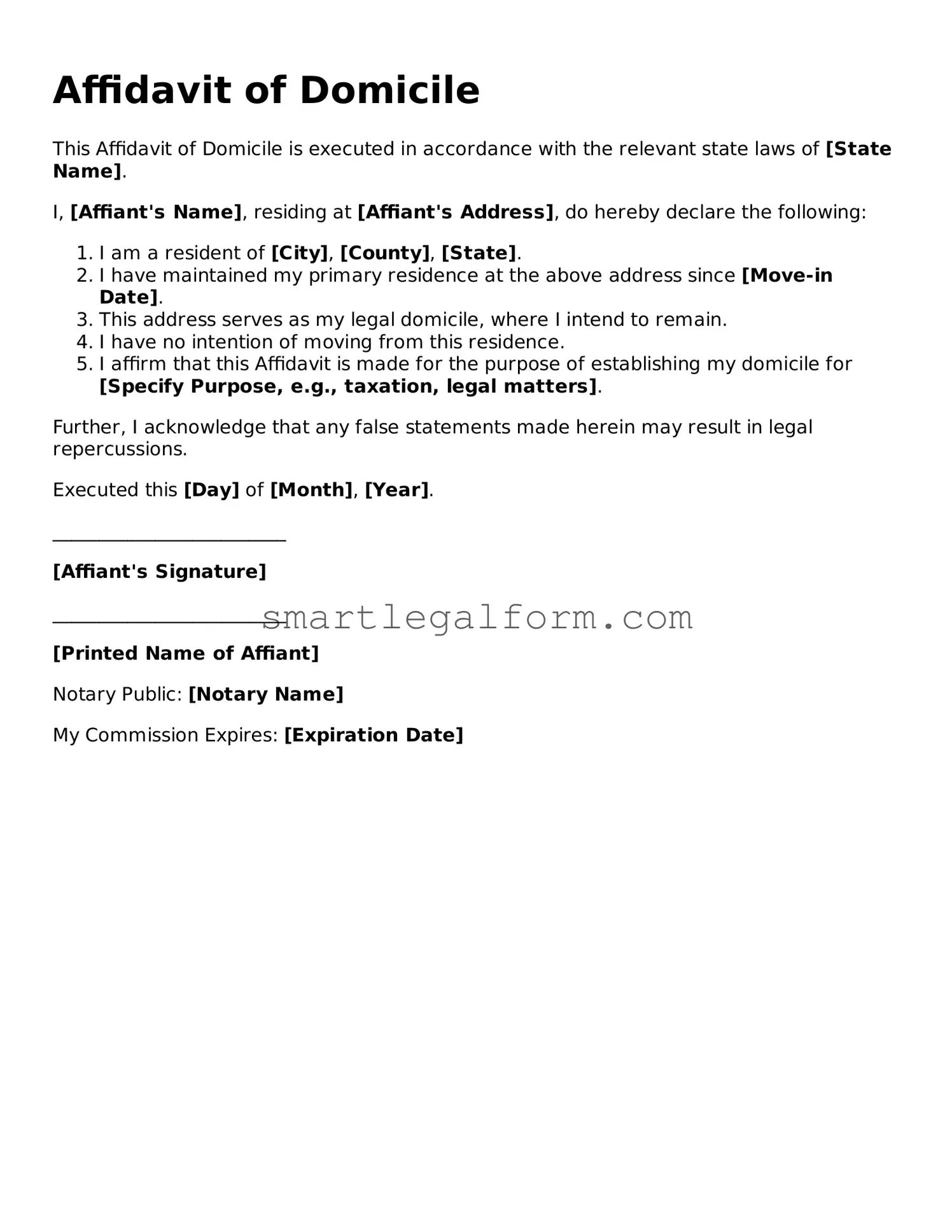Attorney-Approved Affidavit of Domicile Form
Form Preview Example
Affidavit of Domicile
This Affidavit of Domicile is executed in accordance with the relevant state laws of [State Name].
I, [Affiant's Name], residing at [Affiant's Address], do hereby declare the following:
- I am a resident of [City], [County], [State].
- I have maintained my primary residence at the above address since [Move-in Date].
- This address serves as my legal domicile, where I intend to remain.
- I have no intention of moving from this residence.
- I affirm that this Affidavit is made for the purpose of establishing my domicile for [Specify Purpose, e.g., taxation, legal matters].
Further, I acknowledge that any false statements made herein may result in legal repercussions.
Executed this [Day] of [Month], [Year].
_________________________
[Affiant's Signature]
_________________________
[Printed Name of Affiant]
Notary Public: [Notary Name]
My Commission Expires: [Expiration Date]
Common mistakes
Completing the Affidavit of Domicile form accurately is crucial for various legal and financial processes. However, many individuals make common mistakes that can lead to delays or complications. One frequent error is providing incorrect personal information. Names, addresses, and dates must be precise. Even a small typo can create issues down the line.
Another mistake involves failing to sign the document. An unsigned affidavit is not valid. It’s essential to ensure that the form is signed in the appropriate section, typically in the presence of a notary public. Additionally, some people neglect to date the affidavit. A missing date can raise questions about the document's validity and timing.
Inaccurate residency details often cause problems as well. Individuals should clearly state their current domicile and any previous residences. Omitting past addresses or providing incomplete information can lead to confusion regarding residency status.
Not providing supporting documentation is another common oversight. While the affidavit itself is a sworn statement, accompanying documents may be necessary to substantiate claims. This could include utility bills, tax returns, or identification that confirms residency.
Some individuals may also fail to follow the specific instructions outlined for the affidavit. Each jurisdiction may have different requirements regarding format, notary procedures, or additional information needed. Ignoring these guidelines can result in the form being rejected.
Another mistake is not reviewing the completed form for clarity and accuracy. It is vital to read through the affidavit carefully before submission. Misunderstandings or unclear language can lead to complications in processing.
Finally, individuals sometimes overlook the importance of seeking assistance if needed. If there are uncertainties about how to fill out the affidavit, reaching out for help can prevent errors. Consulting with a legal professional can provide clarity and ensure that the form is completed correctly.
Dos and Don'ts
When filling out the Affidavit of Domicile form, it’s important to get it right. Here are some things to keep in mind:
- Do: Provide accurate information about your current residence.
- Do: Sign the form in front of a notary public.
- Do: Include all necessary personal details, such as your full name and address.
- Do: Double-check for any spelling errors before submitting.
- Don't: Leave any sections blank; incomplete forms may be rejected.
- Don't: Use outdated information; always provide your current address.
- Don't: Forget to date the form; this is crucial for its validity.
- Don't: Alter the form in any way; use the official version only.
More Types of Affidavit of Domicile Forms:
Single Status Certificate - Facilitates the marriage process by confirming single status.
Death Certificate Affidavit - The Affidavit of Death can help resolve questions about inheritance.
Affidavit Letter of Support Marriage Sample - Affidavits can serve as strong supporting evidence in proving the marital relationship is genuine.
Similar forms
- Affidavit of Identity: This document serves to verify a person's identity, similar to how the Affidavit of Domicile confirms a person's residence. Both documents require a sworn statement and can be used in legal proceedings.
- Affidavit of Heirship: This form establishes the heirs of a deceased individual. Like the Affidavit of Domicile, it is a sworn statement and can be used to clarify ownership of property.
- Declaration of Trust: A Declaration of Trust outlines the terms of a trust and identifies the trustee and beneficiaries. Similar to the Affidavit of Domicile, it serves to clarify ownership and intent regarding property.
- Power of Attorney: This document grants someone the authority to act on another's behalf. Both the Power of Attorney and the Affidavit of Domicile require notarization and serve to affirm legal standing in property matters.
- Will: A Will outlines how a person's assets will be distributed after their death. While the Affidavit of Domicile is often used during probate, both documents help clarify intentions regarding property.
- Certificate of Residence: This document certifies a person's residence for various legal purposes, similar to the Affidavit of Domicile, which confirms where a person lives.
- Quitclaim Deed: A Quitclaim Deed transfers interest in property without guaranteeing clear title. Like the Affidavit of Domicile, it is often used in real estate transactions to clarify ownership.
- Affidavit of Support: This document is often used in immigration cases to show that a person can financially support another. Both affidavits require a sworn statement and can be critical in legal processes.
- Affidavit Letter of Support for I-751: This document is essential for verifying the authenticity of a marriage when applying to remove conditions on residency. It often includes insights from friends or family, as highlighted by resources such as Top Forms Online.
- Certificate of Title: A Certificate of Title proves ownership of property. Similar to the Affidavit of Domicile, it is essential for establishing legal rights to property.
